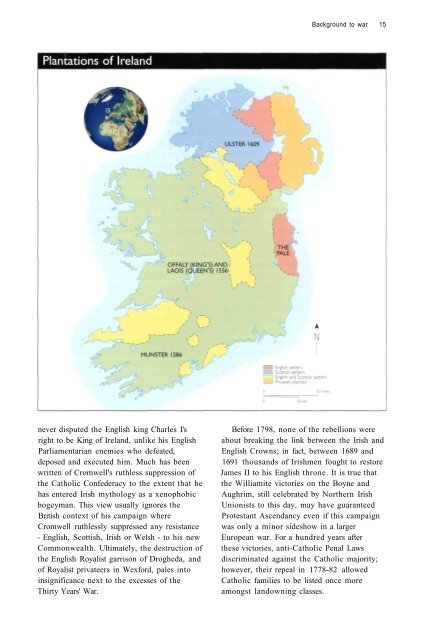You also want an ePaper? Increase the reach of your titles
YUMPU automatically turns print PDFs into web optimized ePapers that Google loves.
Background to war 15<br />
never disputed the English king Charles I's<br />
right to be King of Ireland, unlike his English<br />
Parliamentarian enemies who defeated,<br />
deposed and executed him. Much has been<br />
written of Cromwell's ruthless suppression of<br />
the Catholic Confederacy to the extent that he<br />
has entered <strong>Irish</strong> mythology as a xenophobic<br />
bogeyman. This view usually ignores the<br />
British context of his campaign where<br />
Cromwell ruthlessly suppressed any resistance<br />
- English, Scottish, <strong>Irish</strong> or Welsh - to his new<br />
Commonwealth. Ultimately, the destruction of<br />
the English Royalist garrison of Drogheda, and<br />
of Royalist privateers in Wexford, pales into<br />
insignificance next to the excesses of the<br />
Thirty Years' <strong>War</strong>.<br />
Before 1798, none of the rebellions were<br />
about breaking the link between the <strong>Irish</strong> and<br />
English Crowns; in fact, between 1689 and<br />
1691 thousands of <strong>Irish</strong>men fought to restore<br />
James II to his English throne. It is true that<br />
the Williamite victories on the Boyne and<br />
Aughrim, still celebrated by Northern <strong>Irish</strong><br />
Unionists to this day, may have guaranteed<br />
Protestant Ascendancy even if this campaign<br />
was only a minor sideshow in a larger<br />
European war. For a hundred years after<br />
these victories, anti-Catholic Penal Laws<br />
discriminated against the Catholic majority;<br />
however, their repeal in 1778-82 allowed<br />
Catholic families to be listed once more<br />
amongst landowning classes.



